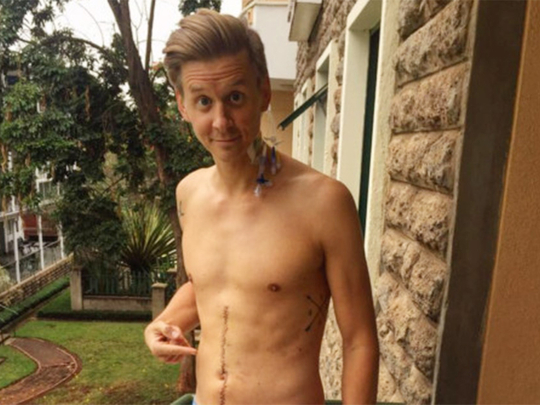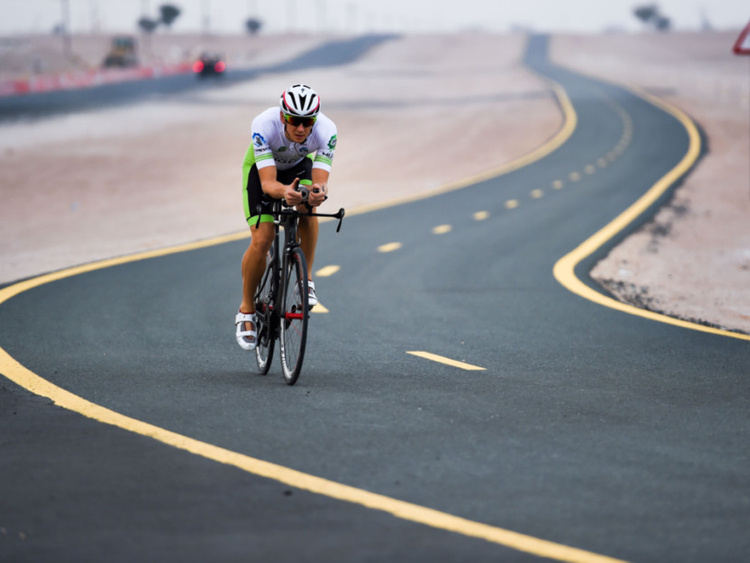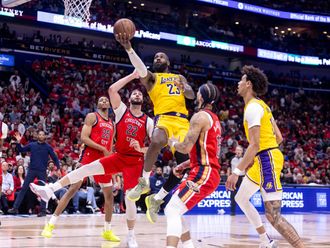
Dubai: As a triathlete Luke Mathews prides himself on how far he can push his pain threshold, but he won’t want to relive his latest limit after almost dying last September.
The Dubai-based Englishman fell ill on a flight from Zambia to Kenya on his way back to the UAE after travelling to the Zambian capital of Lusaka during the Eid holidays to meet his girlfriend Nicola’s parents for the first time.
Volvulus, a birth defect, which he was unaware he had and can happen at any time, led to an unattached part of his large intestine looping around itself and becoming twisted causing an obstruction. Normally, the large intestine is attached to the abdominal wall but in Luke’s case - it was floating.
See an interactive: What it takes to be an ironman
“It happens a lot in dogs and horses and they are usually put down,” said the 32-year-old from Lincolnshire, who has taken part in two Ironman World Championships since taking up triathlon in 2011, and is now head coach at Optimal Tri based out of Optimal Fitness in Studio City.
“Once it flips there’s no way to get it back and if it gets flipped and distended to the brink of popping… if it had popped it would have been good night. You can’t survive if such an organ pops.”
Complications led to his small intestine inverting on itself as well, which caused another blockage that had to be removed. Then his spleen ruptured due to the trauma, prompting a third surgery - all within the space of 11 days.
“That third operation was the worst in terms of the body being able to pull through. The specialist said that if I had been an average Joe I would have been long gone. If it hadn’t been for my fitness levels I would have been coming back in a coffin.
“I didn’t think I was going to die but people close to me thought I was. The surgeons said that if anything else happened they wouldn’t know what to do, so it was better to get somewhere where I felt more comfortable.”
Luke was therefore flown back to Dubai via medevac a week later once he had stabilised. “It could have happened anywhere at any time,” he said of his ordeal. “But they say if you are going to get ill in Africa, you want to do it in either Nairobi or South Africa. If I had stayed in Lusaka - like my girlfriend had wanted me to, because she didn’t want me to take the initial flight once I had started to feel unwell - I don’t know what would have happened.
“I also have to be thankful that it happened now that I’m at my fittest, because if it had struck in my ‘70s or 80s it would have been man down. It would have happened at some point - so perhaps now was the best time and I’ve no other choice but to crack on and get on with it.”
“The only reason I had that insurance was because of my bikes, they are the main thing I care about and cost Dh30,000 to Dh40,000 plus, so if one of those missing or gets damaged… because of that my medical insurance was good as well as an add-on, and I wasn’t even travelling with my bikes.
“There are so many little ifs and buts like that, that fell in my favour.”
Despite all this, he still intends to get back to competing in 2018.
“It’s only given me more drive. Why am I still here? Because I was so fit. So, why would I not want to carry that on? If my body needs to fight again for whatever reason it needs to be in top form,” said Mathews, whose weight has plunged from 75-kg to 64-kg after his surgeries.
“Stretching and flexibility all come from your core and obviously my stomach has been opened three times so it’s a long road back.
“So far, my body has responded well and I’m looking to compete at half distance again in Italy in June before the half-distance world championships in South Africa in September.
“But I won’t be back to where I was, which was competing at full distance, until 2019,” added Mathews, whose Ironman World Championship best finish is top 50 in his age group in under 10 hours.
A full ironman is a 3.86-km swim, 180.25-km cycle and 42.2-km run, while a half Ironman is a 1.9-km swim, 90-km cycle and 21.1-km run.
“With my new-found depths in pain tolerance I should be able to push even more, the only thing is I don’t know how my body is going to react without a spleen or half my large intestine.
“The specialist seems to think I’ll be fine without my intestines, but the spleen is good for fighting infection. Obviously, athletes push their body to extremes and push their immune systems low because they are asking more of the body.
“It’s a learning process to see how far I can push it without becoming more susceptible to a common cold having a worse effect on me, because the spleen distributes cells to fight infection.
“It all feels doable,” he said of this year’s planned road to recovery. “But at the same time, I don’t want to overdo it.”













